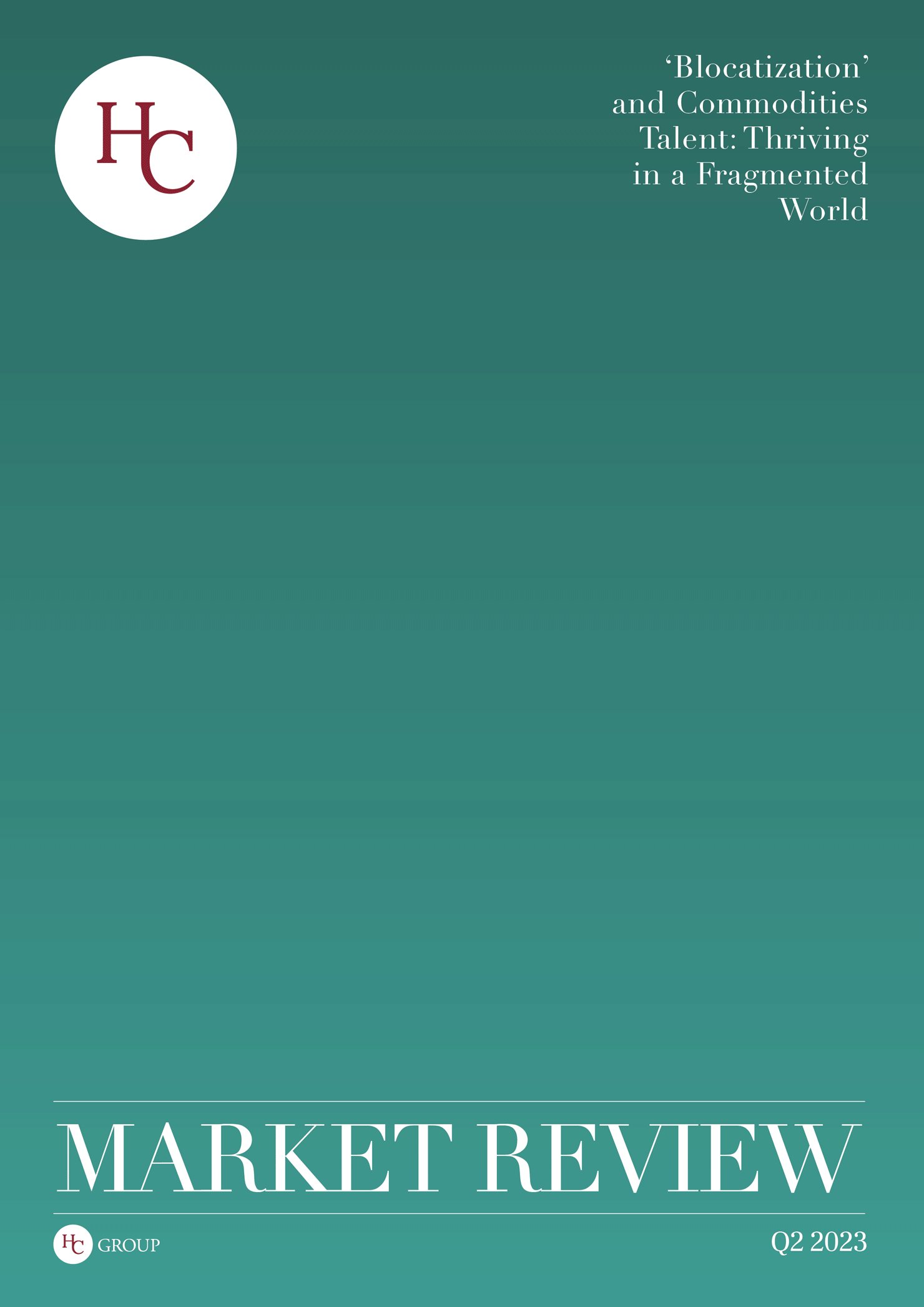Our Q2 2023 Market Review delves into the latest trends shaping the energy and commodities sectors. In this review, we explore the impact of deglobalization and the re-evaluation of commodities as strategic assets, as highlighted by Jeremy Shapiro, Research Director at the European Council on Foreign Relations, during a recent episode of the HC Insider Podcast. Shapiro coins the term 'blocatization' to describe the risk of trading blocs aligning around dominant geopolitical players, forcing companies and individuals to choose sides and limit their range of operations.
These disruptive forces, coupled with the ongoing energy transition and digitization, are key drivers reshaping the industry. Their repercussions will have far-reaching effects, particularly on talent strategies employed by commodity players. To navigate these turbulent markets and emerge as true leaders, companies must adapt their talent approaches to survive and thrive in the face of these transformative trends. Additionally, our Q2 2023 Market Review features our coverage of notable talent moves, providing valuable insights into the dynamic landscape of the industry.
Here, we present an overview of the industries covered in the review, offering you a glimpse into its content. To access the complete articles and talent moves, please click on the following link: Q2 2023 Market Review.

Liquid Fuels
Experienced oil traders and professionals who possess the ability to handle significant risks have become increasingly challenging to recruit, primarily due to the implementation of advanced retention and bonus programs. In the US, lucrative crude and NGL exports amid lingering macro-economic and geopolitical uncertainty are fuelling more talent demand. In EMEA, with Russian crude flowing primarily to Asian, Indian and Middle Eastern refineries, trading businesses are increasingly seeking oil products traders who can capture arbitrage trading opportunities between Europe and other regions.
During the second quarter, there was strong demand for power trading professionals, while the trend varied for specialists in carbon and environmental products across different regions.
Gas and LNG
With gas and LNG prices lower than last summer, storage almost full, and weak demand for LNG from Asia, the energy markets are more optimistic for this summer – albeit cautiously, as supply risks persist for next winter. Talent movement is limited due to deferred bonus schemes. Still, the gas and LNG talent market remains buoyant both for participants and candidates. Globally, hedge funds, banks and trading houses continued to lead the charge for LNG talent hiring. However, participants are coming up against a formidable shortage of suitable candidates.
Power and Environmental Products
During the second quarter, there was strong demand for power trading professionals, while the trend varied for specialists in carbon and environmental products across different regions. hiring activity in carbon markets has been subdued in Europe and APAC. In Europe, there has been a high demand for power traders over the past year due to the need to navigate unprecedented market risks and take advantage of significant price fluctuations. HC Group is seeing a worsening shortage of analytics experts in both the power and carbon markets.
Sustainability
Cost management has taken centre stage in 2023, as commodity companies grapple with high inflation and the repercussions of deglobalization. But it is also crucial to strike a balance between talent needs and sustainability goals. The transition to a more sustainable future requires a workforce equipped with the right expertise. However, there is a significant talent gap in specialized areas such as renewable energy, energy efficiency, and environmental and sustainable management. To attract talent committed to sustainability, organizations must demonstrate their dedication to environmental and social responsibility.
Many trading houses seek to enter the lithium, copper, nickel, and aluminium sectors, as they view the energy transition as a driving force behind their expansion plans.
Metals and Mining
In the face of macroeconomic uncertainty, elevated interest rates, and declines in prices of significant metals, there are concerns regarding the performance of participants in the metals and mining industry and their requirements for talent acquisition. HC Group is still assisting clients involved in metals recycling and battery metals, albeit at a reduced pace. Many trading houses seek to enter the lithium, copper, nickel, and aluminium sectors, as they view the energy transition as a driving force behind their expansion plans.
Agriculture and Nutrition
Energy trading houses and hedge funds continued to expand their agri prop trading teams, at a time of strong returns for many Agri traders, high market volatility and ever-increasing food prices. Demand for biofuels traders is continuously supported by decarbonization efforts from energy companies. But supply is tight as this talent pool is highly specialized, sparse and is now wooed by both agriculture and energy participants. In the animal nutrition sector, the growing use of innovative technologies, digitalization and the deployment of new sustainable strategies are changing the combination of skillsets needed from talent.
Corporate Functions
With the imperative of maintaining cash discipline in the months and years ahead, finance roles have become highly sought after. Simultaneously, compliance and legal roles have become increasingly business critical for energy and commodities trading, enabling firms to navigate the complexities of geopolitical and regulatory changes. In the US, trading entities seeking to strengthen their finance teams are increasingly emphasizing the need for accountants, financial controllers, and auditors with experience working for the Big Four accounting firms.
Commodity Technology and Innovation
In Q2, the race for tech talent continued to heat up as traditional energy players ramp up their trading capabilities, catching up with other domains where algorithmic trading is more prevalent, such as forex and equities. The development of systematic trading technologies has been primarily driven by hedge funds who solidified their position in the commodities asset class, fuelling intense competition for talent. They are closely followed by the banks, whose focus on macro trading proved unrewarding due to unfavourable macro factors like the war in Ukraine, persistent inflation and interest rate hikes.

